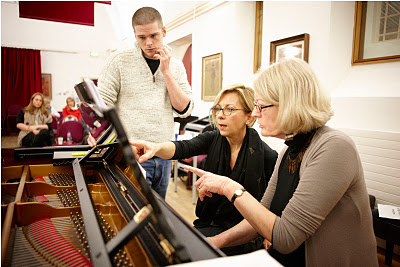It's been a couple of days since term finished. I'm now back home in Poland and my body has decided some rest is long overdue, and has basically shut down. I'm not really surprised, I've felt some form of crash coming for a couple of weeks now, and I'm just glad I made it to the end of my singing commitments in fair shape.
One of these commitments, one in particular was a challenge, albeit an exciting one. Last Friday I sang in the RWCMD's Opera Gala with the college orchestra. It has to be said, this is probably a form of performing that I am the least used to: static concert with orchestra. It presents a unique set of problems, some of which I was ready for and some of which threw me in the first days of rehearsals.
First of all, the orchestra is behind you, in close proximity. The last time I dealt with a situation like that was performing in the Gate with Opera'r Ddraig and (to a lesser degree due to the size of the ensemble) also with the Rogue Opera Company. However there we had a fairly large stage space all to ourselves as the singers, and a set to navigate, and if anything it was difficult to hear the orchestra in places. With a pit orchestra, being onstage you usually hear very little of the orchestra, and that creates its own set of problems, especially with keeping time. In the college concert hall on the other hand, the sound from the not-so-chamber* orchestra was always close, and always on the edge of being overpowering (I'm speaking of my feeling onstage, not the received balance in the auditorium). That coupled with the acoustic of the hall (which I know to be excellent as far as the audience is concerned, but tricky for myself as a performer) meant that especially during first rehearsals of pieces, where the orchestra were reading the music, and sorting out balance seemed an unattainable dream, I was standing there, singing, but not getting anything back from the hall, hearing nothing but the orchestra. It's difficult to resist the temptation to try and 'give more' in that situation, but we have to, because let's face it: in a loudness war against 40 players, we don't stand a chance. So the only recourse is to stick to what worked in the piano rehearsals and trust that the conductor will sort out the balance somewhere down the line.
RWCMD Chamber Orchestra, conducted by David Jones, rehearsing excerpts from Don Giovanni with Dorothea Herbert and Will Helliwell
The next awkward difficulty was with how static the performance had to be due to the limited ammount of space and also the necessity to constantly sing straight out. For someone who is used to a certain degree of 'acting' even in recital settings, this was a new-ish experience. After all, it's difficult to not let the music and text move you, or in a way even take over your body, and we all want to show that we're not just voices, but it's necessary to find a way to feed that into the confines of a concert performance.
Then we move on to the standard difficulty of moving from working with piano to getting used to the orchestral sound. This has a new dimension because of the proximity I mentioned before. On top the usual issues of lacking the piano's percussive element and the difference in texture, depending on where you stand, you lose half of what's going on. Standing by the first violins for the entire concert, I must admit I missed the cellos and double bass, especially as normally they would be my first point of reference as a baritone.
I guess the only advice that works when shifting to a new sound world is to stick to what you know and get on with it, trusting that those responsible for the big picture will get it right. Thankfully this concert was a success and the experience of working on it was a valuable one. I hope the orchestra enjoyed it as well, I know accompanying is not their favourite job. Not only is it seemingly less rewarding than other types of repertoire, but it's also incredibly difficult, and I have to say I was amazed at how well the players handled it. From my point of view, an orchestra accompanies much less than the piano. Because of the colour, richness, and (let's face it) volume, it feels more like they 'lift' the entire piece, with the voices just sitting lightly on top and being a bit of a finishing touch (soundwise, though we also have the text and story). I personally felt much more like a part of a bigger picture than like a soloist.
I apologise to any singers among my readers, this must all seem like I'm stating the obvious, but in case you hadn't noticed, that's what this blog is mostly about. Besides, it's good to remind oneself of the obvious every now and again.
* With regards to the size of the orchestra in relation to the form of the concert, a friend of mine upon walking into the hall to sit in on a rehearsal said: 'Holy <expletive>!'


